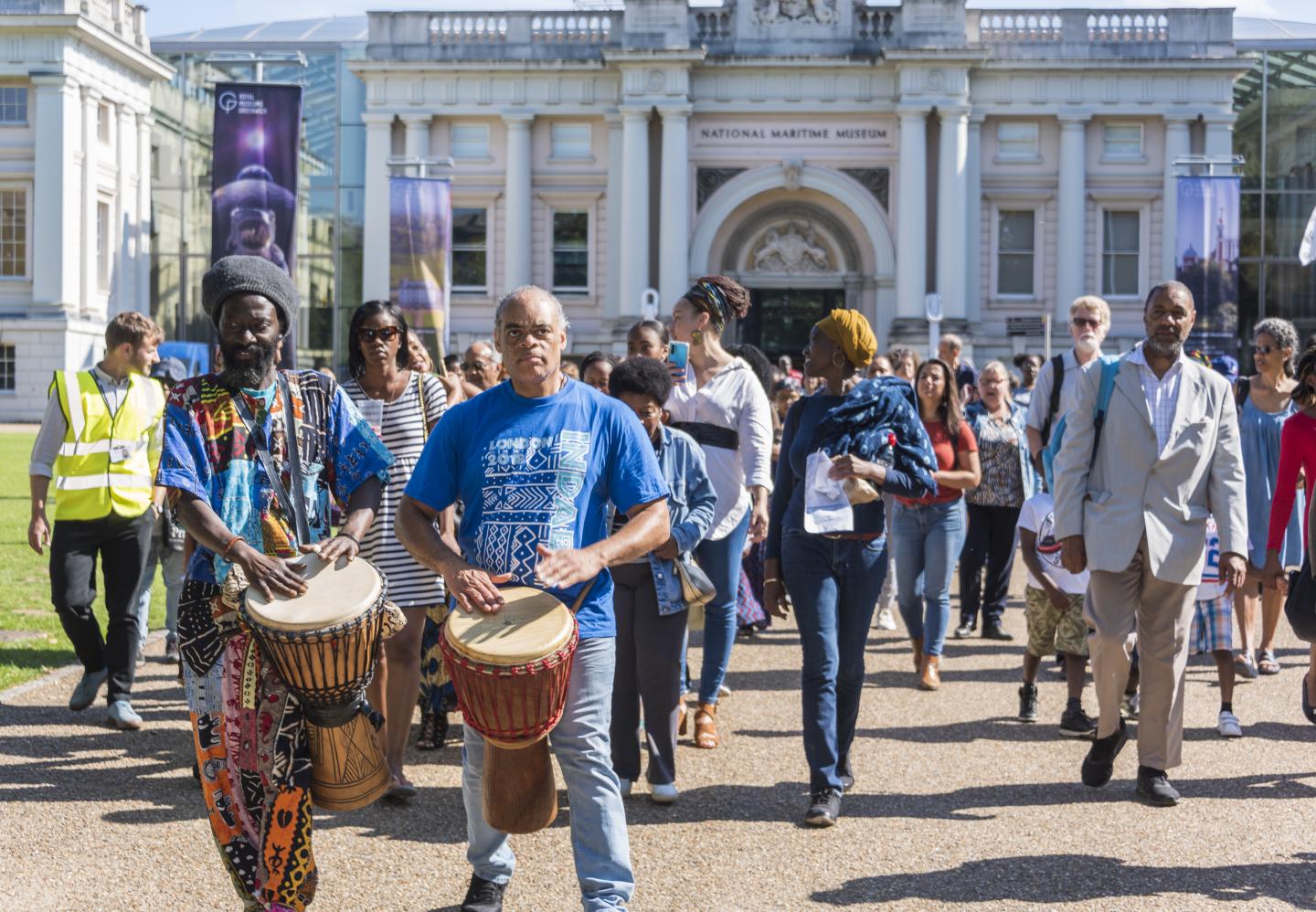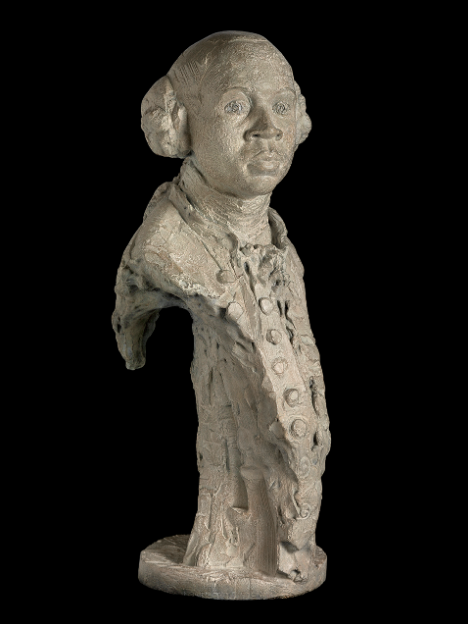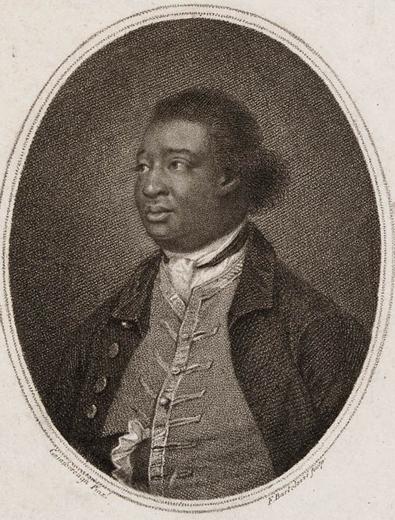
Ethno Vox is an award-winning musical team, who run community choirs, groups and workshops across the UK.
Their performances and events form a key part of the National Maritime Museum's commemorations during International Slavery Remembrance Day. Find out more about why they choose to be part of this poignant event.
What does International Slavery Remembrance Day mean to you?
There are many reasons why this day is special to us.
It’s the day designated by UNESCO, to serve as a reminder that enslaved Africans were the driving force of their own liberation. It’s special because we mark this day to not only remember our collective history but to pay tribute to the men and women who fought against oppression.
Through their struggles and desire for dignity and freedom, they contributed to the universality of human rights. It’s special because we remember the history and lives of the people who fought for our collective freedom.
While this was one of the most cruel and debasing acts in human history from one nation to another, one of extreme trauma which is often forgotten, we reflect and salute the millions of lives lost, and those of their descendants forever changed through this awful injustice of enslavement.
Though we acknowledge the legacy of superiority and privilege people from the Black diaspora feel those in power still perpetuate to this day, on this day we celebrate our strength and creativity in adversity.

On this day we remember how they were taken from their homeland of Africa, and dispersed in the West Indies (where our parents come from), The America’s and Europe, the approximately 2 million who lost their lives in the Middle Passage, the long hours of work on the plantations, the beatings and lynchings, the effects of which are still evident today.
We celebrate the lives of men and women who, sold into slavery, revolted against the slave trade system to gain freedom and independence. We now look at this rebellion as a deep source of inspiration today as we fight against all forms of servitude, racism, prejudice, discrimination and injustice - legacies of the slave trade unfortunately very much alive today.
On International Slavery Remembrance Day, we celebrate the ingenuity of our ancestors, mapping out their escape plans through the coded spirituals and Underground Railroad under the noses of the slave masters, we celebrate the lives of Harriet Tubman who led 100s to freedom, and Frederick Douglas and Olaudah Equiano who fought, along with others, tirelessly for the abolition of the slave trade.
The history of the slave trade is one marked with pain and cruelty, but also courage, freedom and pride. We believe it's important to remember this period in history as all humanity is part of this story both in its good and bad deeds.
It’s the day we remember those who came before us, and use this collective memory as a way to build a better world and show the historical and moral connections that unite people globally."
What do you think it is important that the National Maritime Museum marks this moment?
Ethno Vox has been an integral part in the International Slavery Remembrance Day programme at the National Maritime Museum for over five years, delivering performances for the opening and closing ceremonies and open workshops focusing on audience participation and education of Negro Spirituals and their historical significance in the survival and emancipation of the slaves.
Singing under the propeller at the museum has proven to be an ideal location as the voices echo throughout the halls of the museum attracting visitors to join in with us, whether they’ve come specifically to commemorate International Slavery Remembrance Day or just on a general visit.

The workshops, one in the morning and another just after the break in the afternoon, last approximately 40 minutes. We deliver the sessions which include participants learning and understanding some of the Spirituals that were typically sung on the plantations.
Many of the songs we choose may be known, but the different types of Spirituals, their meanings and coded messages are not, and it’s been a great experience for us as to watch as participants have a ‘light bulb’ moment as they sing the songs with new understanding and feeling. They will never sing Spirituals like Go Down Moses, and Swing Low Sweet Chariot in the same way again.
We’ve also been privileged to lead the procession from the National Maritime Museum down to the River Thames at the end of the day, where all those who have visited the museum and taken part in the various programmes throughout the day are invited to join us as we march down to the riverside singing songs of freedom like We Shall Overcome.

Once at the river collectively we share poetry, reflections, and Ethno Vox lead out in what has become the riverside anthem - Bob Marley’s Redemption Song. One of the most powerful moments of the whole day is the ensuing period of reflective silence and scattering of petals into the river in remembrance of all the lives lost on the seas during the Trans Atlantic slave trade.
It is poignant that the docks here in Greenwich was one of the major trading ports in the UK. It’s a sobering, reflective and very moving ceremony, and we are honoured, very honoured to lead it.
How important do you think International Slavery Remembrance Day is in the context of the current Black Lives Matter movement?
International Slavery Remembrance Day is the one day in the calendar that we commemorate the abolition of the slave trade.
It’s the one day we globally remember the deep connections of our shared history and acknowledge the awful legacy and its systemic roots embedded within the world economic, educational and political institutions. It is because of the 400 years of slavery that the African diaspora have been and continue to be treated as if their inalienable human rights do not matter.
International Slavery Remembrance Day is at the forefront of demonstrating the consequences of treating any people without equal rights. International Slavery Remembrance Day reminds us all that slavery is the cancer of institutional racism and that when not acknowledged and left unchecked, the vestiges are inherent in the conscious and unconscious behaviours of all cultures and communities, world-wide.
In 1833, the Royal Assent of the Slavery Abolition Act was only the very beginning of institutional recognition that Black Lives Matter.
We do not celebrate but commemorate; we don’t riot, we protest; we don’t ask but demand to be seen and heard. There really is no point of 28 August 1833 if the acknowledgement still permits Black lives to be treated as chattel and dispensable.
International Slavery Remembrance Day reminds us that there is a new phase in the movement that now has had the People’s Assent the world over, of which there is no turning back.
Unless nearly 200 years on, we break the yoke by taking the knee off Black people’s neck, then modern-day slavery will continue in the sweatshops, and the international trafficking of little girls and women into the sex trade, not just here in the UK but the world over, will continue.
What do you hope for International Slavery Remembrance Day’s role in the future?
International Slavery Remembrance Day has international recognition having been set up by UNESCO in 2016 but countries such as Haiti, Senegal, France and Britain recognised the impact several years earlier by commemorating with different legacies such as marches, museums and artistic events.
If participating countries were to have higher profile events and International Slavery Remembrance Day partner with other major organisations such as the IOC, IAAF, or FIFA in championing the cause at major sporting events this would significantly raise the profile of the message. In addition each country could mark the day by having a three-fold approach:
- Publishing a list of industrial sectors that commonly employ sweatshop labour markets.
- Museum events where countries hand over the ‘torch of freedom’ raising awareness of similar and specific issues across international borders.
- Synchronised global marches and events where beacons are lit up across continents.
In this era of heightened awareness of the Black Lives Matter movement, International Slavery Remembrance Day can be bold in calling out institutional racism and reminding society that such practices and biases hark back to hundreds of years old conventions, rites and rituals.
A permanent exhibition could be established featuring a specific individual each season. This exhibition should be dedicated to the achievements of Black people of the African diaspora and the roles they’ve played in shaping not only their own countries but that of other nations around the world, in every facet of life.
International Slavery Remembrance Day must be committed to impartially challenging racism in all its forms every day, not just on 23 August and Ethno Vox is deeply appreciative of the National Maritime Museum’s commitment to commemorating the abolition of the slave trade.
… Acknowledge and see who they were, and what they did is a part of me
I will use my voice, and make theirs heard
Because to be remembered with honour is what they deserve.
Tracey-Ann Sikenjana – REMEMBERING THEM




